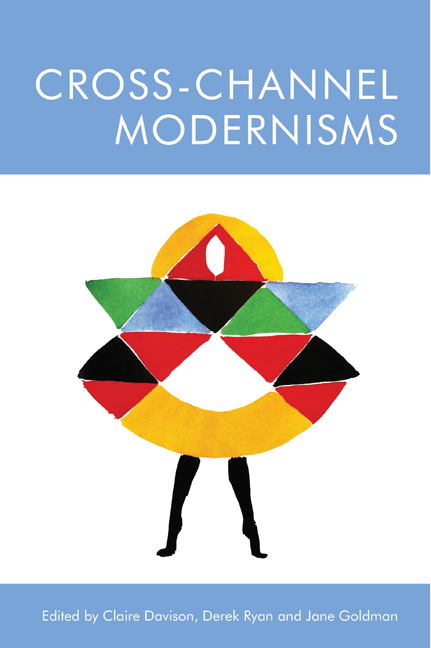Book contents
- Frontmatter
- Contents
- List of Figures
- Notes on Contributors
- Introduction: Cross-Channel (Transmanche) Modernisms
- Interlude: Translating
- 1 On Unknowing French? Rhythm and Le Rythme on a Cross-Channel Exchange
- 2 Impressions of Translation: Ford Madox Ford’s Cosmopolitan Literary Crossings
- 3 Sydney Schiff and Marcel Proust: Table-talk, Tribute, Translation
- Interlude: Fashioning
- 4 Cross-Channel Modernisms and the Vicissitudes of a Laughing Torso: Nina Hamnett, Artist, Bohemian and Writer in London and Paris
- 5 Jean Rhys’s comédie anglaise
- 6 Betray to Become: Departure in James Joyce’s A Portrait of the Artist as a Young Man
- Interlude: Mediating
- 7 Close Up and Cross-Channel Cinema Culture
- 8 Debussy at the Omega Workshops
- 9 Across the Other Channel: Elizabeth Bowen and Modernist Mediation
- Coda: ‘You, who cross the Channel’: Virginia Woolf, Departures and the Spectro-Aesthetics of Modernism 215
- Index
2 - Impressions of Translation: Ford Madox Ford’s Cosmopolitan Literary Crossings
Published online by Cambridge University Press: 03 October 2020
- Frontmatter
- Contents
- List of Figures
- Notes on Contributors
- Introduction: Cross-Channel (Transmanche) Modernisms
- Interlude: Translating
- 1 On Unknowing French? Rhythm and Le Rythme on a Cross-Channel Exchange
- 2 Impressions of Translation: Ford Madox Ford’s Cosmopolitan Literary Crossings
- 3 Sydney Schiff and Marcel Proust: Table-talk, Tribute, Translation
- Interlude: Fashioning
- 4 Cross-Channel Modernisms and the Vicissitudes of a Laughing Torso: Nina Hamnett, Artist, Bohemian and Writer in London and Paris
- 5 Jean Rhys’s comédie anglaise
- 6 Betray to Become: Departure in James Joyce’s A Portrait of the Artist as a Young Man
- Interlude: Mediating
- 7 Close Up and Cross-Channel Cinema Culture
- 8 Debussy at the Omega Workshops
- 9 Across the Other Channel: Elizabeth Bowen and Modernist Mediation
- Coda: ‘You, who cross the Channel’: Virginia Woolf, Departures and the Spectro-Aesthetics of Modernism 215
- Index
Summary
The Channel crossings in Ford Madox Ford's biography are complex. His grandfather, Ford Madox Brown, was born in France and studied in Belgium. Ford's father was a German who studied Provençale and emigrated to Britain. During the First World War, Ford wrote propaganda books triangulating English, French and German culture. After returning from the Western Front, he emigrated to France. A primary emphasis of this essay will be how his formative collaboration with Joseph Conrad reinforced an ideal of the conscious artistry of French fiction (exemplified by Stendhal, Flaubert and Maupassant). Ford was delighted when The Good Soldier was described by a publisher friend, John Rodker, as ‘the finest French novel in the English language’ (Ford 1927: 5). The essay will explore how Ford's own work bears out his injunction to translate English sentences into French and then back into English as a means of clarifying and purifying them. This reverberation of languages, people and texts across the Channel will be shown to be constitutive of Ford's version of Impressionism in literature. However, the essay will also argue that the transmanche is always doubled, for Ford, by the transatlantic. American writers living in Britain and Europe, from Henry James and Stephen Crane at the turn of the century, to Ezra Pound in Edwardian London, and Gertrude Stein and Ernest Hemingway in Paris in the 1920s, themselves mostly saturated with continental literature and art, continually contributed to the development of Ford's Impressionism and modernity. The conclusion will suggest that Ford's cultural internationalism – his belief in a ‘Republic of Letters’ – crosses all borders, foreshadowing recent discussions of global modernism and of world literature – nowhere more so than in his last, immense and inclusive comparative study The March of Literature (1938).
The cosmopolitanism of Ford's heritage has been dealt with often enough to require only brief rehearsing here. His father's family, the Hüffers, were well established in France, Italy and the Netherlands as well as Germany. One had gone into tobacco in the United States. Franz Hüffer, Ford's father, was a free-thinking Schopenhauerian who championed Wagner, and ended up as music critic for The Times.
- Type
- Chapter
- Information
- Cross-Channel Modernisms , pp. 50 - 68Publisher: Edinburgh University PressPrint publication year: 2020



